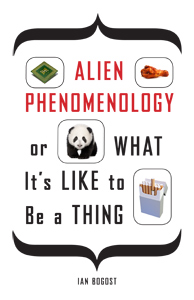
Perrine, Florida, 11/11/77, by Stephen Shore, via 303 Gallery
In a New Yorker essay a few weeks back, Laura Miller considered the various ways in which science fiction writers have imagined aliens, from the 18th century through today. Perhaps inevitably, the way we think about the alien tends to say something about us: “These aliens may not all be made in the image of their creator,” Miller observed, “but each one is a child of our psyche.”
Ian Bogost begins his recent book Alien Phenomenology by noting the speculative fascination with the stubborn old rumor of flying saucer remains hidden away at Roswell Army Airfield. But his real point is that we are immersed in the alien already. In fact, almost every thing is alien to us, except us: We have no idea what it’s like to be a tree, a bat, a coffee mug, a skyscraper. And unlike human-imagined aliens, they exist. “The alien isn’t in the Roswell military morgue, or in the galactic far reaches,” Bogost writes. “It’s everywhere.”
Bogost has a great track record of following curious thoughts to compelling ends. A professor of digital media and interactive computing at the Georgia Institute of Technology, he may be best known for the work of his firm Persuasive Games. I first spoke to him back in 2006, for a piece about anti-advergame Disaffected, in which players assumed the role of “employees forced to service customers under the particular incompetences common to a Kinko's store.” More recently, a game called Cow Clicker took the pointlessness of Farmville and other social games to absurd levels — and became, to Bogost’s surprise, a hit. He also created “a chapbook of game poems,” described by Levi Rubeck in the current Kill Screen as an ekphrastic response to videogames.
Alien Phenomenology touches on some of his other computer and gaming projects, but it has a much broader philosophical goal. On a fundamental level it offers an alternative to the “correlationist” view of the world we live in, which assumes that “humans and the world are inextricably tied together, the one never existsing without the other.” Obviously, that’s a very, very deeply ingrained bias (the notion of “human-centered design” is a usefully blunt manifestation of it), and the sheer improbability of overcoming it is part of the appeal of this book. Bogost walks us through a series of responses to correlationist thinking, culminating in his own concept, Alien Phenomenology, and offers a few tools and strategies along the way. “To put things at the center of a new metaphysics,” he writes, “requires us to admit that they do not exist just for us.”
As I’ve noted, the book is short but not exactly light reading. I found myself re-reading chunks of it over a period of weeks, interested in what it was suggesting about ways to look at the world, using examples (like the photography of Stephen Shore) that struck me as surprising coming from an author whose previous books have been firmly rooted in game culture. Plus, I kept stumbling across news items that reminded me of his thinking. It got me curious about Bogost's motives, which led to a few questions, and answers, below.
What is your "cocktail party" answer to the question: What is your book about? Assume you’re at a cocktail party where nobody has heard of, say, object-oriented ontology.
The book is about the secret lives of things. The fact that we humans are not the center of the universe, despite our powers to influence it, but we are one among innumerable entities, natural and created, simple and complex, real and fictional. Those other things have something like what we call "experience," although they don't experience the world the way we humans do.
This isn't just true of animals or plants, but articulated buses and football teams as well. To understand what it's like to be a thing, we have to combine science with philosophy, evidence with speculation.
Two news/blog items recently made me think of your book. First this bit on Robert Krulwich's blog about research into how a dodder vine determines that a nearby plant is a tomato plant (the answer seems to be something analogous to smell). Second, this summary of research about using brain scanners to learn "what your dog is thinking." (The point seems to be to figure out what your dog thinks about you.) Both struck me as somewhat in line with, but perhaps falling short of, what you are getting at in Alien Phenomenology.
Another example, the "What the Petunia Knows" conversation on On Point recently, might be the closest, actually. If you listen (no transcript I think), it's all about how "see" and "smell" and "feel" aren't exactly accurate descriptions, but they're the best we can do, and we'll have to squint to understand. That's what I talk about in terms of caricature, speculation, and so forth. The issue remains: we're still mostly interested in ourselves. The first chapter of the book being discussed, What a Plant Knows, begins: "Think about this: plants see you."
Well, sure. But plants "see" dirt and sun and worms too. What about them? The problem is, we humans are extremely self-centered. It goes beyond mere anthropocentrism, and beyond the pride and gluttony with which we've torn asunder our planet. In fact, it goes back to the Enlightenment. Even though Kant called his revolution in philosophy "Copernican," really it was just the opposite: rather than show that humans aren't the center of the universe, critical philosophy held that we can never think beyond our own minds thinking about things. Thus human experience and behavior became our only concern.
Even though science considers itself beyond this trap, describing the universe "as it really is," most science is really just concerned with making new discoveries and inventions that benefit human life. If you look at things that way, both Copernican revolutions ended up being human-centered ones.
So it's far more terrifying to people when I start talking about the experience of a dog in relation to the grass, or of a mountain to a digital camera sensor. To talk about a dog's experience of a human is relatively easy to metaphorize; we do it almost by instinct, even if it goes unanalyzed. To talk about the dog's experience of the grass requires us to speculate about both separately, and then to speculate about the dog's speculative, metaphorical understanding of the grass. This is why science isn't sufficient: it doesn't help us grasp how things grasp one another in their unique, hidden ways.
One of the promises of the speculative turn is that it might help us become more humble. It's a very special and perhaps even new kind of humility, because it's not meant to curry favor among other people. When we talk about ecology or energy policy, we may think we're being humble, but usually we're self-interested. Saving the planet always means saving the planet for us. And that's understandable; we are us, after all.
But what if we admitted that everything has at least a potentially equal claim to existence? Not just redwood trees and giant pandas, but also crude oil and smallpox. We'd be forced to admit that the universe is a place of unending tensions, pushing and pulling on one another with no clear and obvious winner or loser. We need metaphysics to keep us from both extremes, radical anthropocentrism on the one hand, and utter nihilism on the other.
At various points in the book you're pretty much directly addressing philosophers. So I want you to explicitly step out of that context: Why should someone who's not a philosopher care about what you're addressing here?
Forgive me for starting this by excerpting from something else, but here's how I addressed this, in part, in New Scientist recently:
If we really want to understand the nature of the universe, then we must accept two principles. First, everything is an alien to everything else. And second, the experience of "being" something else can never be verified or validated, but only speculated about, even if rational deduction drives that speculation. In the 21st century, then, to fully understand the world in which we live, we are going to need poetry as well as science and philosophy.
Then 1,000 words later:
It is not enough to ponder the role things have in human enterprise, nor to limit empathy to living creatures. Once everything is on the ontological table, our human choices become more complex. Such grand challenges as health, energy, climate or poverty can no longer be addressed as problems for humans alone.
So that's a start. Here's some more:
- Philosophers aren't just bearded men in tweed. Many professional philosophers are like that, of course, and I try to speak to them pretty directly in the book. But we're all philosophers, if we're interested in understanding the world. It's not enough to be a scientist or just a citizen.
- When it comes to understanding our human place in the world, we can't pretend that we're only among people. Or people and animals. Or people and animals and plants. We have to deal with the fossil fuels and the toasters. So, really, any attempt to address any kind of relationship to issues like the ones I quoted myself talking about above has to consider that there are more actors at work than just people and governments and panda bears.
- Care about things themselves, having an interest in what they are as such, might prevent us from turning everything whatsoever into a utility for something else, particularly a convertible financial instrument. I'm not making a Marxist argument here, I'm just saying that we tend not to think of anything as something other than a tool for human use. This isn't making us more content, secure, or prosperous.
- Stuff's just interesting. Ask any kid. That's the idea behind the closing chapter on "wonder." We stop thinking that way after a while, though. Isn't it fascinating that I have to justify to the public that it would be interesting to ponder things like cake and oil derricks?

